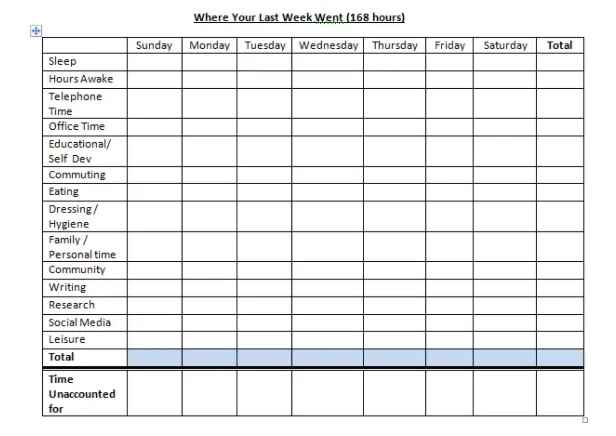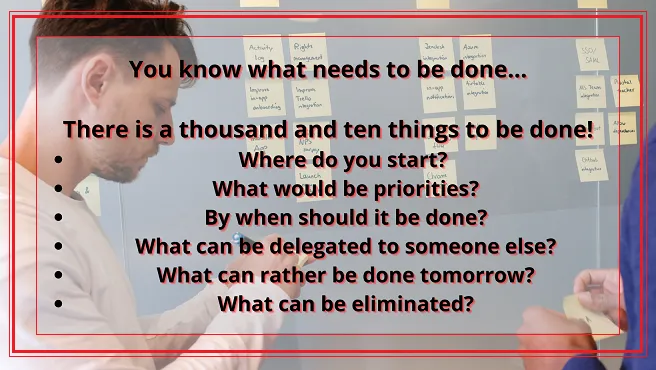Born of personal and often costly experience I am sharing here what works (for me) and why, when it comes to getting your life organized.
Due to the volume of the content, I will publish it in three posts, but they will be relevant to one another. So it would be beneficial if you read all three posts.
I will start by publishing today's post about "the importance of knowing what needs to be done".
On Thursday, March 17, I will publish a post about "the importance of planning your time".
On Tuesday, March 22, I will publish the final post about "taking control of your time to fir your needs.".
If you battle with time management or when it feels as if you never have enough time in a day, make sure you don't miss any of these posts.
As I progress through publishing these three posts, I will link them together for easy reference.
We will put the most important factor of any project center stage- the time you allocate to it.
We will look at:
- Undeniable facts and some major reasons why you might have failed so far in your efforts to manage your time.
- Setting off on the wrong foot when it comes to making your to-do lists - how to avoid it!
- Sorting the wheat from the chaff in your life - how to avoid time-wasting
- How to become a master at time management and drastically improve the quality of your life - for real!
You'll Never Solve a Problem Unless You Admit That You Have a Problem.
Have you ever caught yourself complaining that you don’t have enough time? Are there just not enough hours in the day? I know I've done it many times!
Maybe the time has come to pay more attention to proper time management!
Why does it seem that some people just “cruise” through the day, getting everything done, while others battle to just find enough time to squeeze everything in? The answer is quite simple: it is time management!
If we want to master time management, there are three principles we need to focus on - and they are:
- Develop a prioritized “to-do” list.
- Develop a diary or calendar and start planning your time.
- Control time to fit your needs.
We All Have 24 Hours in A Day! What Is Happening To Yours?
Before we can change anything, we need to determine how we are spending our time now!

Photo by Luke Chesser on Unsplash
We need to be as accurate as possible and record our activities to the finest detail! Let us use the activity of attending a meeting as an example.
Let's say you record the time spent at a meeting today, and the total time at the venue was 1 hour and 30 minutes. But 30 minutes were spent waiting for the meeting to start. Then do not record the time for attending the meeting as 1.5 hours. Show your time as 30 minutes “waiting”, and 1 hour for “attending a meeting”. You could have used those 30 minutes to do some reading, researching a topic, or any other more productive activity.
You may be surprised at how much time got wasted when you reveal to yourself how many activities were not productive towards achieving your main objectives when you record your time over a period of 1 week.
Examples of such activities are:
- Waiting
- Commuting/traveling.
- Talking to the wrong people.
- Taking unnecessary breaks.
- Searching for an address or venue (lack of planning before leaving).
- Spending too much time on social media sites (eg. just for socializing).
- Unscheduled surfing of the internet.
- Unplanned/unnecessary phone calls.
I include a sample worksheet here to assist you in recording how you spent your time over the last week.

This is a sample only. Add and delete items to accommodate your own needs.
In the sample sheet above, you can capture the total amount of hours slept at the top. Deduct that time from the total of 168 hours (or 24 hours every day) which will be your hours of being awake and enter that into "Hours Awake".
Then, enter the time spent on each activity throughout the day. Add up all the time spent on activities and get the total of the hours spent on all your activities.
Enter that into the area for "Total". Deduct the "total" time spent from the "Hours Awake". The answer goes into "Time Unaccounted for" right at the bottom.
For a start, this will give you an indication of whether you are getting enough sleep (or maybe too much...lol), and where your time is going while being awake.
We often fall into the trap of “being busy”, but that doesn't mean that we are being productive!
We need to know how to identify the difference between just being busy vs. being productive. To properly manage our time, we need to set priorities and start planning.
While driving in your car, you could be listening to motivational messages on a podcast. Instead of just waiting at the airport to board your flight, you can do some reading or catch up on research using your laptop. Instead of making phone calls whenever you remember to phone someone, why not schedule 30 minutes or an hour as “phone time”, and make all those phone calls at the designated time?
Create A To-Do List.
By getting everything out of your head and onto paper, a computer screen, or onto your mobile phone, you now have something tangible that you can see.
You can start comparing activities, move them around, add levels of importance and create deadlines. By looking and comparing activities with deadlines in front of you, it becomes easier to see how you can evenly spread activities and meet different deadlines without over-committing yourself to too many activities at the same time. It also becomes easier to see whether your activities bear any relevance to your goals/objectives or not.
Some guidelines for creating your “to-do” list:
- Write down all your activities that need to be done. As you complete the activities, either cross them off or mark them off with a tick.
- Write down any deadlines that need to be met (including date and time).
- Now organize your activities into time slots, such as what needs to be done in a week, or in one day.
- Check your diary/calendar to confirm that you haven’t forgotten any commitments or events.
As activities and events now come up, it becomes easier (especially if you use this method in conjunction with your goal setting) to determine whether certain activities should go onto your “to-do” list or not. You should be able to quickly see if the activity will benefit you in reaching your targets or goals, or whether it is a waste of time.
Set Priorities.
Listing all your activities and just starting from the top, is not an effective way of doing it!
By properly prioritizing your activities, your “to-do” list becomes an incredibly powerful tool.
A method I like using is called the "ABC Method". By using this method, you can determine which activities are urgent and/or will be most productive in accomplishing your objectives. You can shift your time and attention to the activities which are most important on a daily and weekly basis.
Follow these steps to apply this method:
- As mentioned before, list all your activities.
- Assign the letter "A” to the most important activities (those activities which will have the most impact on achieving your goals and/or meeting deadlines – often a “must do today”. These are priorities.)
- Assign the letter “B” to the next most important activities. (These may be important but not imperative to get done today – not a priority for the day).
- Lastly, assign the letter “C” to the least important activities. (These need to get done, but there is no urgency).
What I normally do from here (this is just me personally), I also add a number to each activity, in order of importance. Eg., I will have A1, A2, A3, B1, B2, C1, C2. Then I obviously start at “A1”, and systematically work through them all.
I also try not to have more than three "A" activities on any given day. I would also try to limit the total of my "A" and "B" activities combined for one day, to a maximum of 6 to 8 activities (depending on the time required for each activity – which is an important factor that needs to be considered while doing your planning).
For today, I will conclude with this:
- You need to know what needs to get done.
- Once you know what needs to get done, you need to prioritize to know where to begin, without overwhelming yourself.
Thank you for reading my post. I do appreciate it!
